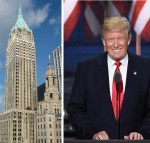The Trump Organization has nabbed a new tenant at 40 Wall Street, with Jay Suites inking a 12-year deal for 50,000 square feet.
The co-working firm’s lease at the 1.3 million square-foot building covers floors 27 through 29 and was said to cost $40 per foot, a relative bargain for Class A office space in the Financial District.
According to a Transwestern report, Class A asking rents Downtown averaged $58.06 per foot in the second quarter and the vacancy rate was 17.4 percent. (Ten years ago, the Wall Street Journal ran a story headlined, “Trump fills 40 Wall Street with incentives, low rents.”)
Although he noted that the Trump name turns off some potential clients, Jay Suites’ co-founder, Juda Srour, says the firm is getting very good feedback. “The building is gorgeous and the lobby is pristine,” Srour said. “They polish the marble every day.”
Read more



Srour also raved about the building’s new amenity and event space, The Vaults, which includes a wine room, café, bar, pool room and lounges. “You can see the vaults and cages,” Srour said of the former banking space.
Jay Suites was represented by Sean Black of his eponymous firm, Black, while the Trump Organization was represented in-house by Eric Trump and Myles Fennon. The agreement was reached some time before the death Thursday of Eric Trump’s mother, Ivana Trump, at age 73.
The 28th and 29th floors are interconnected and were previously occupied by another co-working company, WorkBetter, which left the space during the pandemic. (Clicking on its website for the Wall Street location now yields the message, “Looks like something went wrong.”)
Srour said the 27th floor is dedicated to no more than seven enterprise clients that need space for 20 or more employees while Jay Suites’ other two floors have private offices for one or more people. A one-person desk rents for $700 per month, he said.
Jay Suites, founded by Juda and his brother Jack in 2008, opened the Downtown location last month as its 10th in the city — nine in Manhattan and one in Brooklyn. It was part of the explosive growth of shared office space in the city, but expanded deliberately, rather than at the breakneck pace that led to WeWork’s spectacular rise and fall.
